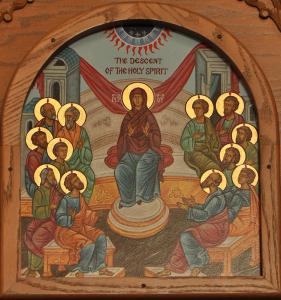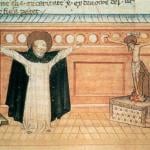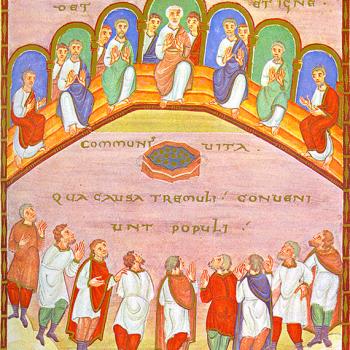
The Holy Spirit is the Spirit of Love. In the Godhead, the Spirit is often said to reflect the love which is shared between the Father and the Son, though it must always be understood that in saying this, the Holy Spirit is a person and not some impersonal force. The Father loves the Son, and through the love of the Father to the Son, we can discern the Spirit, even as we can discern the Spirit in the love of the Son for the Father. God, as Trinity, loves us, and that love is revealed to and shared with us through the incarnation and the self-sacrificial love of the hypostasis of the Son, the Logos. In that love, Christ then shares with us the Spirit, giving it over to us when his work of love is complete. Thus, through the Son, the love of the Father and the Son together, and in that mutual love, the love of the Spirit, is shared with and sent into the world:
The Logos, the Son of god, is the Hypostasis that offers itself as sacrifice. What He offers sacrificially to the Father is the Divine nature [estestvo], the Body that belongs to Himself as to the other Hypostases. Such is His special hypostatic role in the inner-triune life. He offers His heavenly body as a kind of spiritual self-revelation – He sacrificial self-revelation in heaven. And this is the sacrifice of filial love to the Father, which is brought to completion by the Holy Spirit, the Hypostatic love of Both. [1]
The Spirit of Love found in the Godhead is sent to and received by creation. The Spirit joins together those who are separate and apart, breaking down artificial barriers and distinctions used to keep people divided and fighting against each other. Where sin is found, the Spirit and the love shared by the Spirit, come to cover up and heal the harm which such sin has done. Truly, love covers a multitude of sins, and through such covering, creates the bonds needed to overcome the division found in humanity (and in creation). The Holy Spirit, exemplifying the unity of the Godhead by being the personal representative of the love found in the Godhead, shares with creation the unity which is found in God, helping it to reflect the unity of God. Thus, at Pentecost, at the coming of the Holy Spirt, we see the first fruit of the Spirit upon the world as it resides on Christ’s early followers. “The Holy Spirit, proceeding from the Father, came upon the apostles with the generous largeness of his majesty, and bestowed upon them gifts of charismatic grace.” [2] The coming of the Spirit was sudden, and though they knew to expect some manifestation of the glory of the kingdom of God, the way it came took them by surprise:
And suddenly a sound came from heaven like the rush of a mighty wind, and it filled all the house where they were sitting. And there appeared to them tongues as of fire, distributed and resting on each one of them. And they were all filled with the Holy Spirit and began to speak in other tongues, as the Spirit gave them utterance (Acs 2:1-4 RSV).
The division of humanity, which can be seen in the way people cannot understand people speaking different languages, is shown to be overcome by the Spirit, so that any misunderstanding they have with each other does not have the final say:
Now there were dwelling in Jerusalem Jews, devout men from every nation under heaven. And at this sound the multitude came together, and they were bewildered, because each one heard them speaking in his own language. And they were amazed and wondered, saying, “Are not all these who are speaking Galileans? And how is it that we hear, each of us in his own native language? Parthians and Medes and Elamites and residents of Mesopotamia, Judea and Cappadocia, Pontus and Asia, Phrygia and Pamphylia, Egypt and the parts of Libya belonging to Cyrene, and visitors from Rome, both Jews and proselytes, Cretans and Arabians, we hear them telling in our own tongues the mighty works of God.” (Acts 2:5-11 RSV).
We must not let logical distinctions be used to create focal points of division in humanity, and when they arise, we must do what we can to overcome them. We are to do so with the gifts the Spirit gives us. Different people will have different gifts. One such gift, one which reflects what happened at Pentecost, is the gift some people have when dealing with a multitude of languages, how some can learn and speak many of them easily. They are to use that skill to help bring people together, to help people communicate with each other and come to know and love each other, even as they are to use it to help translate the message of the Gospel so that anyone, anywhere in the world, will have access to it.
We are all called to be one, drawn into the life of Christ, in the body of Christ, the church, through the Spirit of Love:
The Church is for everybody the living body of Christ and, in accordance with the word of God, there is found in her (1) the collection of human individuals of whom she is composed, (2) the organic form which unifies them into one whole, and (3) the action of the Holy Spirit whereby this whole lives and moves in a common use of all God’s gifts and sanctified activities. [3]
The Spirit is shared with us so we can participate in the love of God, and in that participation, realize our integral unity with the rest of humanity, indeed, the rest of creation, a unity which reflects the unity of the Godhead. We find our own personal, logical distinctions can remain in that integral unity, the “body of Christ,” but only if we do not allow those distinctions to serve as a basis to create conflict within the body itself. We are all to be one as God is one, a oneness which allows for plurality. As we find in the oneness of God, the Father, Son and Spirit are all equally God, with none better or greater than any other, we must relate to each other as equals, hoping to share with each other the glory of the kingdom of God.
[1] Sergius Bulgakov, The Eucharistic Sacrifice. Trans. Mark Roosien (Notre Dame, IN: University of Notre Dame Press, 2021), 26.
[2] St. Bernard of Clairvaux, Sermons for the Summer Season. Trans. Beverly Mayne Kienzle and James Jarzembowski (Kalamazoo, MI.: Cistercian Publicans, 1991), 74 [Pentecost: Sermon Two].
[3] Vladimir Solovyev, God, Man & The Church. The Spiritual Foundations Of Life. Trans. Donald Attwater (Cambridge: James Clarke & Co., 2016), 84-5.
Stay in touch! Like A Little Bit of Nothing on Facebook.
If you liked what you read, please consider sharing it with your friends and family!
N.B.: While I read comments to moderate them, I rarely respond to them. If I don’t respond to your comment directly, don’t assume I am unthankful for it. I appreciate it. But I want readers to feel free to ask questions, and hopefully, dialogue with each other. I have shared what I wanted to say, though some responses will get a brief reply by me, or, if I find it interesting and something I can engage fully, as the foundation for another post. I have had many posts inspired or improved upon thanks to my readers.













